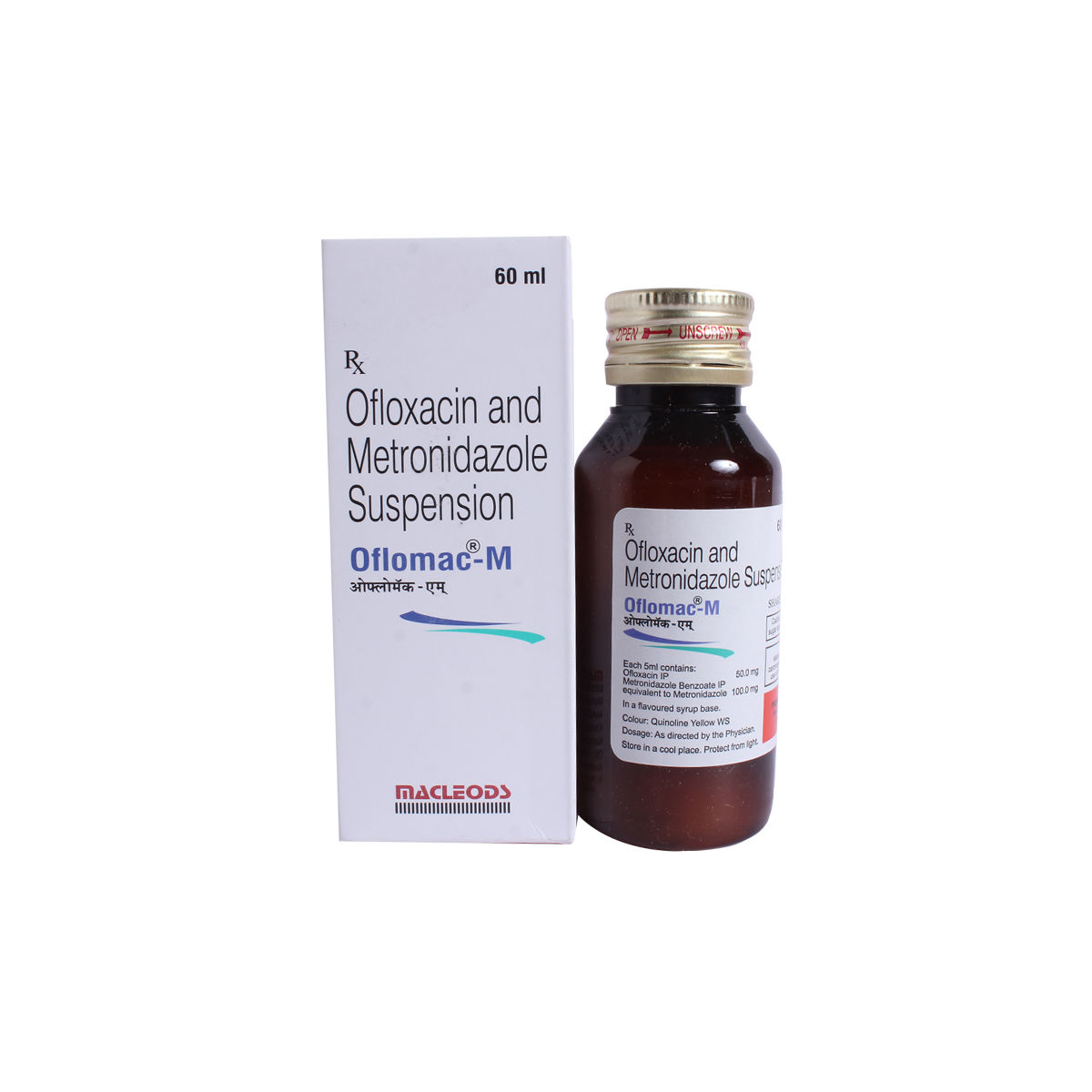Ofloxacin+metronidazole
About Ofloxacin+metronidazole
Ofloxacin+metronidazole is a combination of antibacterial (ofloxacin) and anti-amoebic (metronidazole) medication used to treat various infections caused by bacteria. It is also effective in treating diarrhoea due to mixed infections and amoebic dysentery. A bacterial infection is a condition in which harmful bacteria enter, multiply, and infect our bodies. Diarrhoea is an increase in the frequency of bowel movements, resulting in loose and watery stools. Amoebic dysentery (Also Known as Amoebiasis) is an intestinal infection caused by the parasite Entamoeba histolytica.
Ofloxacin+metronidazole is a combination of two antibiotics that include Ofloxacin and Metronidazole. Ofloxacin prevents the division of bacterial cells and inhibits their repair mechanism, leading to the death of the bacteria. Metronidazole kills parasites and anaerobic bacteria that cause infections. It works by damaging their DNA. Both antibiotics are bactericidal in nature and work together to effectively treat the infection.
Take Ofloxacin+metronidazole exactly as prescribed. Your doctor will recommend how often you take Ofloxacin+metronidazole based on your medical condition. In some cases, you may experience common side effects, including nausea, vomiting, stomach upset, loss of appetite, dry mouth, a metallic taste, headache, dizziness, drowsiness, and confusion. Most of these side effects of Ofloxacin+metronidazole do not require medical attention and typically resolve on their own over time. However, if the side effects are persistent, reach out to your doctor.
It is not advisable to stop taking Ofloxacin+metronidazole suddenly to avoid unpleasant side effects. The full course prescribed by the doctor should be completed. Inform your doctor if you have any lung disease, epilepsy, difficulty sleeping (sleep apnoea), severe liver disease, or problems with alcohol or other prescription or recreational drugs. Ofloxacin+metronidazole should not be used by pregnant women (especially during the first trimester), breastfeeding mothers, and patients with liver diseases, low blood white cells (leukopenia), seizures (fits), gastrointestinal diseases (like Crohn's disease and inflammatory bowel disease), and other neurological diseases. Ofloxacin+metronidazole may cause dizziness and drowsiness; therefore, avoid driving and operating machinery until you are mentally alert.
Uses of Ofloxacin+metronidazole
• Bacterial Infections: Ofloxacin+metronidazole is effective in treating bacterial infections of the lungs, skin, prostate, urinary tract (kidneys and bladder), and gastrointestinal tract (stomach and intestines).
• Diarrhoea Due to Mixed Infections: Ofloxacin+metronidazole is prescribed for the treatment of diarrhoea caused by a combination of bacterial and parasitic organisms, such as those caused by Giardia lamblia (a parasite) and Clostridium difficile (a bacteria).
• Amoebic Dysentery (Amoebiasis): Ofloxacin+metronidazole is also effective in treating intestinal amoebiasis caused by Entamoeba histolytica, a parasite that leads to diarrhoea and dysentery.
• Gynaecological Infections: Ofloxacin+metronidazole helps in managing pelvic inflammatory disease (caused by sexually transmitted infections like gonorrhoea and chlamydia) and vaginosis (caused by an imbalance of bacteria in the vagina).
• Post-Surgical Infections: Ofloxacin+metronidazole may also be used to treat or prevent bacterial infections after certain abdominal or gynaecological surgeries.
Medicinal Benefits
Ofloxacin+metronidazole is used to treat various bacterial infections affecting the lungs, skin, prostate, urinary tract, and gastrointestinal tract. It is also effective in treating diarrhoea caused by mixed infections (involving both bacteria and parasites) and amoebic dysentery. It is a combination of two antibiotics: Ofloxacin and Metronidazole. Ofloxacin (an antibacterial) prevents the division of bacterial cells and inhibits their repair mechanism, leading to the death of the bacteria. Metronidazole kills parasites and anaerobic bacteria that cause infections. It works by damaging their DNA. Both antibiotics are bactericidal in nature and work together to treat the infection effectively.
Directions for Use
- Ofloxacin+metronidazole may be taken with or without food (excluding dairy), but taking it with food may lessen stomach discomfort.
- Follow your doctor's instructions on the dosage and timing of this medication.
- Swallow Ofloxacin+metronidazole as a whole with a glass of water.
- Do not break, crush, or chew it.
Storage
Side Effects of Ofloxacin+metronidazole
- Nausea
- Vomiting
- Stomach upset
- Loss of appetite
- Dry mouth
- Metallic taste
- Headache
- Dizziness
- Drowsiness
- Confusion
Drug Warnings
If you are allergic to ofloxacin, metronidazole, or any other antibacterial or anti-amoebic agents, please inform your doctor to avoid any unwanted side effects like swallowing or breathing problems, swelling of your lips, face, throat, or tongue. Taking Ofloxacin+metronidazole may increase the chances of developing tendinitis (swelling of a tissue that joins a bone to a muscle) or a tendon rupture. Dairy products should be avoided along with Ofloxacin+metronidazole. Additionally, exposure to sunlight should be avoided while taking Ofloxacin+metronidazole, as it may increase phototoxicity or photosensitivity. Patients with an irregular heartbeat (QT prolongation) should tell their doctor before taking Ofloxacin+metronidazole. Ofloxacin+metronidazole should not be given to the pregnant mother (during the first trimester) and in nursing mothers as it passes into the breast milk. Please inform your doctor before taking Ofloxacin+metronidazole if you have a history of liver disease, low blood white cells (leukopenia), a joint or tendon disorder (such as rheumatoid arthritis), seizures (fits), gastrointestinal diseases (like Crohn's disease and Inflammatory bowel disease), or other neurological diseases. Ofloxacin+metronidazole may cause dizziness and drowsiness; therefore, avoid driving and operating machinery until you are mentally alert. Avoid alcohol consumption while taking Ofloxacin+metronidazole, as it may increase the risk of side effects like dizziness and drowsiness.
Drug Interactions
Drug-drug interaction: Ofloxacin+metronidazole may interact with pain killers (ibuprofen or diclofenac), anti-asthma medications (theophylline), anti-diabetic drugs (glibenclamide), anti-gout drugs (probenecid), anti-cancer drugs (5-fluorouracil), antidepressants (lithium), antiepileptics (phenobarbital, phenytoin), and blood thinners (warfarin).
Drug-Food Interaction: Ofloxacin+metronidazole interacts with dairy products (such as yoghurt) or calcium-fortified juices alone.
Drug-Disease Interaction: Inform your doctor if you have or have ever had a kidney, heart, or lung transplant, kidney disease, low blood white cells (leukopenia), a joint or tendon disorder (rheumatoid arthritis), seizures (fits), and gastrointestinal diseases (like Crohn's disease and Inflammatory bowel disease).
Drug-Drug Interactions Checker List:
Safety Advice

Alcohol
unsafeAlcohol should not be consumed while taking Ofloxacin+metronidazole, as it may increase the risk of side effects like dizziness and drowsiness.

Pregnancy
unsafeOfloxacin+metronidazole should not be taken during pregnancy, especially during the first trimester, as it may cause harm to the fetus. If you become pregnant while taking Ofloxacin+metronidazole, stop taking the medication, and contact your doctor immediately.

Breast Feeding
unsafeOfloxacin+metronidazole may pass into the breast milk, so avoid taking Ofloxacin+metronidazole while breastfeeding.

Driving
unsafeOfloxacin+metronidazole can cause dizziness, confusion, and drowsiness. Therefore, avoid driving or operating machinery unless you are mentally alert and competent.

Liver
consult your doctorOfloxacin+metronidazole to be taken with caution, especially if you have a history of liver diseases. The dose may have to be adjusted by your doctor.

Kidney
consult your doctorOfloxacin+metronidazole to be taken with caution, especially if you have a history of kidney diseases. The dose may have to be adjusted by your doctor.

Children
safe if prescribedOfloxacin+metronidazole can be given to the children if prescribed by a doctor.
Habit Forming
Diet & Lifestyle Advise
- Avoid consuming excessive amounts of caffeine-containing products, such as coffee, tea, energy drinks, cola, or chocolate. Ofloxacin+metronidazole may increase nervousness, sleeplessness, and anxiety caused by caffeine.
- Probiotics should be taken after completing the full course of Ofloxacin+metronidazole to help restore healthy bacteria in the intestines that may have been killed. Taking probiotics after antibiotic treatment can reduce the risk of antibiotic-associated diarrhoea. Certain fermented foods, such as yoghurt, cheese, sauerkraut, kombucha, and kimchi, can help restore the gut's beneficial bacteria.
- Include more fibre-enriched food in your diet, as it can be easily digested by your gut bacteria, which helps stimulate their growth. Thus, fibre-rich foods may help restore healthy gut bacteria after a course of antibiotics. Whole grains, such as whole-grain bread and brown rice, should be included in your diet. Make sure to drink plenty of water or other fluids every day while you are taking Ofloxacin+metronidazole.
- Avoid the intake of alcoholic beverages, as they can make you dehydrated and may affect your sleep. This can make it harder for your body to aid the Ofloxacin+metronidazole in fighting off infections.
Special Advise
- You should consult a doctor if you have symptoms associated with dehydration like dry mouth, excessive thirst, wrinkled skin, little or no urination, dizziness, and lightheadedness after taking Ofloxacin+metronidazole.
Patients Concern
Disease/Condition Glossary
Bacterial Infection: A bacterial infection is a condition in which harmful bacteria enter, multiply, and infect our body. When you get infected with bacteria, you can experience generalized symptoms, like fevers, chills, and fatigue. Bacterial infections vary from minor illnesses, like sore throat and ear infections, to severe brain infections, like meningitis and encephalitis. Anyone can become infected with a bacterial infection. People with weakened immune systems or those taking immunosuppressive medications are more prone to bacterial infections.
Diarrhoea: It is an increase in the frequency of bowel movements, resulting in loose and watery stools.
Amoebic Dysentery: Also known as Amoebiasis, it is an intestinal infection caused by the parasite Entamoeba histolytica. It is commonly transmitted through contaminated water or food. This condition often leads to symptoms such as diarrhoea, fever, and abdominal cramps. In more severe cases, it can result in liver abscesses.
FAQs
Ofloxacin+metronidazole is a combination of two antibiotics that include Ofloxacin and Metronidazole. Ofloxacin prevents the division of bacterial cells and inhibits their repair mechanism, leading to the death of the bacteria. Metronidazole kills parasites and anaerobic bacteria that cause infections. It works by damaging their DNA. Both antibiotics are bactericidal in nature and work together to treat the infection effectively.
Ofloxacin+metronidazole is a combination of antibacterial (ofloxacin) and anti-amoebic (metronidazole) medication used to treat various infections caused by bacteria. It is also effective in treating diarrhoea due to mixed infections and amoebic dysentery.
It is not advised to take alcohol with Ofloxacin+metronidazole. Taking alcohol while taking Ofloxacin+metronidazole can cause serious side effects such as headaches, feeling or being sick, pain in the stomach, hot flushes, a fast or irregular heartbeat, dizziness, drowsiness, etc.
Ofloxacin+metronidazole can make your skin sensitive to sunlight, a condition known as photosensitivity. So, prolonged exposure to sunlight or ultraviolet light should be avoided. In the event of an emergency, always wear sunscreen before going outdoors.
If you miss a dose of Ofloxacin+metronidazole, take it as soon as you remember it. However, if it is almost time for the next dose, skip the missed dose and take your next dose at the regular time. Never take a double dose to make up for the missed one.
No. Ofloxacin+metronidazole is an antibacterial medicine that acts only against bacterial infections, not against viral infections. You should not take it without consulting your doctor first. Self-medication is dangerous and can lower the efficacy of Ofloxacin+metronidazole, leading to antibiotic resistance.
Yes, intake of Ofloxacin+metronidazole may cause dry mouth, and you may feel thirsty frequently. Try to drink plenty of fluids (water with electrolytes) and probiotics. You may also experience dry lips, for which you can use lip balm.
Avoid intake of Ofloxacin+metronidazole if you have a history of liver diseases, low blood white cells (leukopenia), seizures (fits), gastrointestinal diseases (like Crohn's disease, Inflammatory bowel disease), and other neurological diseases.
The common side effects of Ofloxacin+metronidazole include nausea, vomiting, stomach upset, loss of appetite, dry mouth, a metallic taste, headache, dizziness, drowsiness, and confusion. Most of these side effects of Ofloxacin+metronidazole do not require medical attention and gradually resolve over time. However, if the side effects are persistent, reach out to your doctor.









